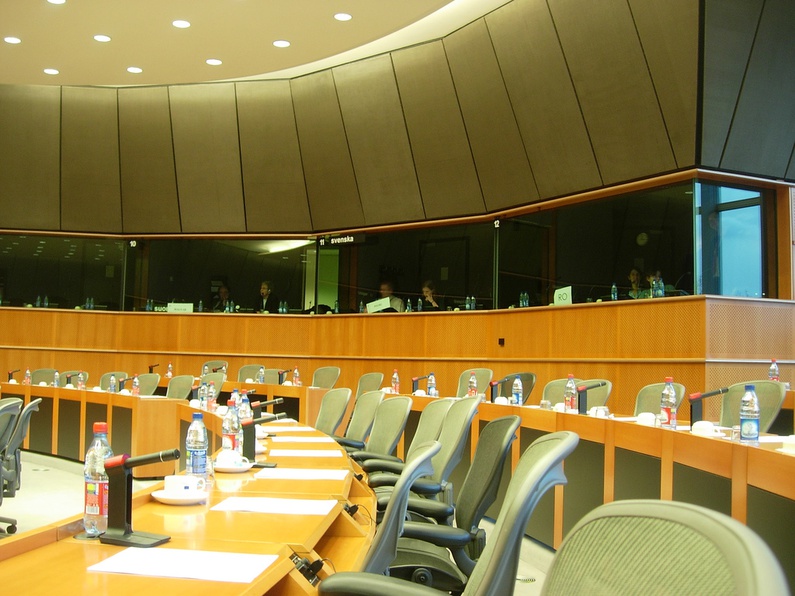
Eu debate 2014: when interpreters steal the show
Published on
Although yesterday’s first debate between the European Commission candidates was neither thrilling nor revelationary, it has shed a light on the issue of conference interpreting in the European institutions, which is often perceived as being of secondary importance. Houston, I think we have a problem.
I wish I had a chance to watch yesterday’s debate in English, because the mastery of this language is, for me, a factor on which I would judge the candidates. Unfortunately, I haven’t been given this chance, because I live in France, where almost everything is voiced-over in French. As such, I could not really hear what the candidates were saying in English, but instead, I could closely observe the job the interpreters were doing.
And I must say that they did a really good job.
But despite this very good job, they made me laugh so much I couldn’t properly concentrate on the content of the debate.
The reason for this is very simple: how can you concentrate on what young, energetic, fresh Ska Keller is saying if instead of her voice you hear the voice of a bourgeois, rather aged man? How can you concentrate when you see a woman who probably starts her day off with a jog and fresh fruit for breakfast on a sunny terrace and instead of her voice you hear the voice of a man who you imagine delighting every evening in a Castle Lafite Rothschild Pauillac 1996 while a green table lamp on his desk bathes mountains of sagacious volumes with its gentle light? It’s a similar experience to listening to a granny reading Trainspotting to lull her five year-old granddaughter to sleep.
No country for young men
There was not just one interpreter. If I am not mistaken, there were five of them – four men and one woman. And although I wouldn’t bet my life on it, none of them was younger than forty years old. How about jobs for young educated Europeans? When I chose to study translation and interpreting in 2007 they told us that job opportunities were really plentiful in this domain in Europe. Really plentiful. They didn’t tell us that being young is a disadvantage in this case, though.
 I couldn’t dismiss the fact that yesterday the interpreters were not neutral. At one moment I asked myself if I would perceive the candidates differently if I was blind and I could only rely on the interpreted content. I realized that I would indeed, because there were moments when the interpreters influenced the speeches with their intonation and the pitch of their voice. It worked in the favour of the phlegmatic Jean Claude Juncker, but completely changed the perception of Ska Keller’s performance. When Guy Verhofstadt gesticulated (and he did a lot of that), a sensitive person would have a heart attack, because the interpreter raised the pitch of his voice so high that mirrors would break. Is conference interpreting a one-man show which has the right to exist independently of the original speech? What if the parallel linguistic realities (the one created by the speaker and the one created by the interpreter) come to be contradictory because of the interpreter’s tone of voice alone?
I couldn’t dismiss the fact that yesterday the interpreters were not neutral. At one moment I asked myself if I would perceive the candidates differently if I was blind and I could only rely on the interpreted content. I realized that I would indeed, because there were moments when the interpreters influenced the speeches with their intonation and the pitch of their voice. It worked in the favour of the phlegmatic Jean Claude Juncker, but completely changed the perception of Ska Keller’s performance. When Guy Verhofstadt gesticulated (and he did a lot of that), a sensitive person would have a heart attack, because the interpreter raised the pitch of his voice so high that mirrors would break. Is conference interpreting a one-man show which has the right to exist independently of the original speech? What if the parallel linguistic realities (the one created by the speaker and the one created by the interpreter) come to be contradictory because of the interpreter’s tone of voice alone?
This is not our show
Yes, I am maybe indulging myself with a little bit of innocent provocation here, but I feel that things are unfair on the European job market. I studied interpreting at university and the professors made a tremendous effort to teach us that we need to be, first and foremost, neutral. That no matter how egocentric we are, this.is.not.our.show. That we take responsibility for what is interpreted, not only on the level of actual words, but at the level of prosody, intonation and lexical stress as well.
The question which I asked at the beginning re-emerges here: why not employ young interpreters, who nowadays spend more time searching for a job than on actual professional activity? Maybe it’s time for a change of guard?



